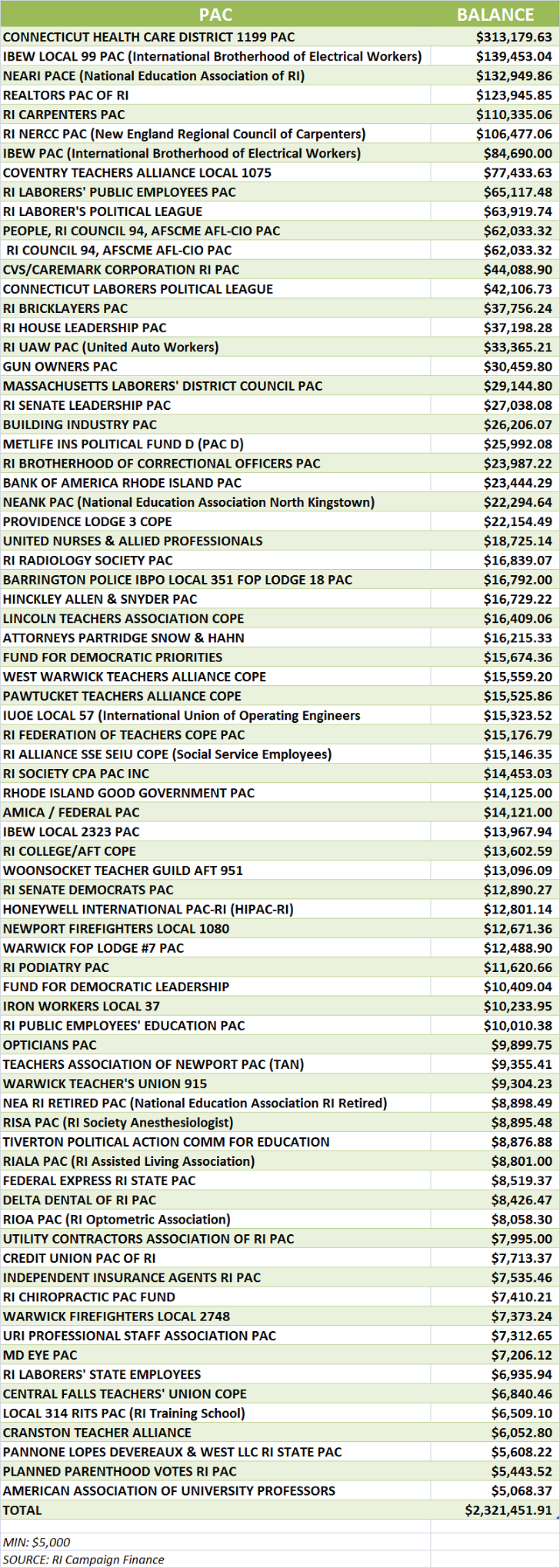The Groups that Run RI: Which PACs Have the Most Cash?
Monday, October 03, 2011
Seventy-six Political Action Committees (PACs) in Rhode Island had account balances in excess of $5,000 as of June 30, a GoLocalProv review of campaign finance reports shows. In total, the groups, which funnel money to mayors, state lawmakers, general office holders and other PACs in an attempt to influence various issues or pieces of legislation, reported having $2,321,451.91 in their accounts by the end of the second quarter, a number that is sure to rise significantly as the 2012 election season nears.
The numbers give a slight glimpse into just how much of a role organized labor is likely to play on a local level in next year’s election, which will have just one statewide race (Senate), but will feature dozens of General Assembly matchups.
The overwhelming majority of PACs in the state have ties to unions, with the Service Employees International Union, International Brotherhood of Electrical Workers (IBEW) and the National Education Association (NEA) topping the list when it comes to account balances.
GET THE LATEST BREAKING NEWS HERE -- SIGN UP FOR GOLOCAL FREE DAILY EBLASTSix PACs Top $100k
Well over half the PACs in the state had less than $20,000 in their accounts by the end of June, but six groups reported having more than $100,000, including the SEIU, IBEW, NEA, Realtors PAC of RI, Carpenters PAC and the New England Regional Council of Carpenters.
The Connecticut Health Care District 1199 PAC, an SEIU outfit, had $313,179.63 as of its last filed report. Similar to the other PACs with high account balances, the group also funnels money to candidates and organizations across the country. However, during the 2010 election cycle, Governor Chafee and Attorney General Peter Kilmartin each received $1,000 contributions from the group. The PAC also made smaller contributions to Providence Mayor Angel Taveras, General Treasurer Gina Raimondo, Secretary of State Ralph Mollis and various state lawmakers.
The local IBEW, whose national organization spent more than any other PAC during the 2008 Presidential election, was second on the local list with $139,453.04. The group did not spend much on candidates in 2010, making a handful of $500 (or less) contributions to General Assembly leadership and Mayor Taveras.
The Realtors PAC of RI also donates money nationwide, but its website says 70 percent of any contribution is “used by the Rhode Island RPAC to support state and local political candidates.” In 2010, the group made $1,000 contributions to gubernatorial candidate Frank Caprio, Mayor Taveras and Treasurer Raimondo.
New Law Seeks To Even Playing Field
While many of the PACs represent different labor organizations or business groups, most have at least one thing in common: they donate to the establishment. With the exception of contributions made to Governor Chafee, an independent, much of the money donated by the state’s PACs goes to elected Democrats.
But a new law passed during the last General Assembly session may put at least a slight dent in the Democrats’ advantage. While it won’t change where the PACs contribute their money, the new law allows candidates that aren’t from a political party to receive matching funds from the state during elections.
Under the public financing law, candidates for the five general offices can receive $2 of public funds for each qualified $1 of private funds, up to $500 from a single source within an election cycle, and $1 of public funds for each qualified $1 of private funds that exceed the $500 limit. Previously, those funds were available only to candidates from political parties, which are defined by law as political organizations that polled at least five percent of the vote in the previous general state election.
“Our political system should encourage a broad range of candidates, a broad range of voices and ideas,” said Senator Erin Lynch, who sponsored the bill. “But we all know that running a campaign, especially one for one of the five general offices, is an expensive proposition. This legislation, by making matching funds available to all qualified candidates and not just from two major parties, will encourage more participation and more points of view. That is good for democracy.”
State Representative William San Bento, who sponsored the bill in the House, said the new law will force candidates to think more about constituents than private contributors.
“If we don’t provide public matching funds for candidates, those running for and being elected to office will be mainly beholden to private contributors. I think most Rhode Islanders would like their elected officials to answer to them, first and foremost,” said San Bento. “This legislation will allow individual citizens, through the use of public funds, to play the most significant role -- financially -- in the efforts of candidates for general office.”
Pension Showdown
Still, the amount of money coming from PACs will continue to be a major factor for elected officials and candidates moving forward, particularly during the General Assembly’s special session on pension reform taking place this fall.
On one side will be the millions of dollars in PAC money influencing state lawmakers; on the other will be pro-reform groups like the newly created EngageRI, which has raised nearly $1 million in support of, and to lobby for, changes to a pension system it believes must be fixed now.
The outcome of the special session will no doubt play a role in the 2012 election cycle.
The only question is how much each side is willing to spend.
If you valued this article, please LIKE GoLocalProv.com on Facebook by clicking HERE.





